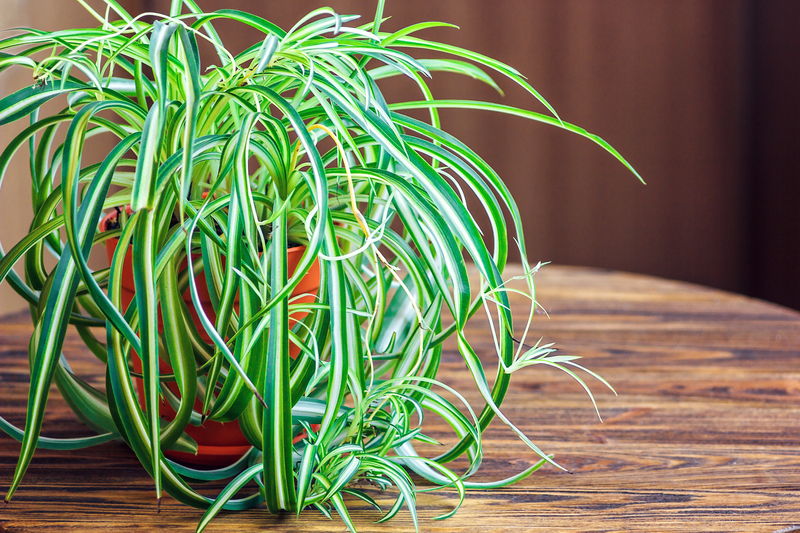Kitchen Scraps to Soil Magic
Posted on 17/06/2025
Kitchen Scraps to Soil Magic: Transforming Waste Into Garden Gold
Have you ever wondered what happens to your kitchen scraps after they hit the trash can? What if you could convert peels, coffee grounds, and eggshells into a transformative force for your garden? The journey from kitchen waste to soil magic is a sustainable practice that not only benefits the environment but also brings life back to your garden soil. Welcome to our comprehensive guide on turning everyday food remnants into nutrient-rich compost--the ultimate secret for thriving plants!

Why Should You Turn Kitchen Scraps into Soil Magic?
- Reduces landfill waste: Food waste accounts for a significant portion of global landfill material. Composting helps minimize this burden.
- Improves soil health: Kitchen scraps decompose into organic matter, providing essential nutrients to your garden soil.
- Promotes sustainable living: Composting supports eco-friendly gardening and reduces your carbon footprint.
- Saves money: Less reliance on synthetic fertilizers as you create your own.
- Enhances plant growth: Nutrient-rich compost fosters lush, resilient plants and improves your garden's biodiversity.
Understanding the Journey from Kitchen Scraps to Soil Magic
Soil magic is more than just a catchy phrase. It encapsulates the transformation of food waste into rich, dark compost teeming with life. As organic material breaks down, it fuels the microscopic army of bacteria, fungi, and earthworms that work tirelessly beneath the soil surface. The end product? A naturally nutritious supplement that's prized among gardeners.
What Kitchen Scraps Can You Compost?
Not every kitchen leftover belongs in your compost pile. Let's break down the basics.
Safe Kitchen Scraps to Elevate Soil Magic:
- Fruit and vegetable peels, cores, and trimmings
- Coffee grounds and filters
- Crushed eggshells
- Tea bags (check for plastic-free)
- Bread and grains (in moderation)
- Nut shells (except walnut shells)
Avoid These Compost No-Nos:
- Meat, fish, and dairy (attract pests and create odors)
- Greasy foods and oils
- Processed foods with additives
- Plastic, metal, or glass
Tip: Always chop larger scraps into smaller pieces--this speeds up the decomposition process, creating soil magic even faster!
How Composting Works: Turning Waste into Soil Magic
Composting is a natural process in which microorganisms break down organic matter. Here's how you can harness kitchen scraps for soil magic:
The Role of Microorganisms in Composting
- Bacteria: The primary workers, breaking down complex organic compounds into simpler forms.
- Fungi and molds: Help decompose tougher materials, like bread and woody bits.
- Earthworms and insects: Further break down matter and aerate the compost, creating fluffy, rich humus.
The key to successful composting is achieving the right balance of ingredients:
- Browns: Dry, carbon-rich materials like leaves, cardboard, and paper.
- Greens: Nitrogen-rich kitchen scraps such as fruit peels and coffee grounds.
- Moisture and air: Essential for microbe activity--keep your compost pile damp and occasionally turn it for aeration.
Easy Steps to Start Home Composting
Making the leap from tossing scraps to soil-enhancing gold isn't as daunting as it seems. Here's a step-by-step guide to help you create your very own compost system:
1. Choose the Right Compost Bin
- Outdoor piles: Simple, cost-effective, best for large yards.
- Tumbling bins: Contained and easy to turn, ideal for medium spaces.
- Worm bins (vermicomposting): Perfect for apartments and indoor use.
2. Collect Your Kitchen Scraps
Use a countertop container or a sealed pail to gather scraps throughout the day. Choose a compost caddy with a charcoal filter to keep odors at bay.
3. Build Your Compost Layers
- Add a layer of browns at the bottom--twigs, shredded paper, or dry leaves.
- Alternate layers of greens (kitchen scraps) and browns.
- Finish with a brown layer to keep smells down and pests away.
4. Maintain Your Compost
- Turn regularly to introduce oxygen.
- Keep moist--think damp sponge, not soaked.
- Add more brown if it's soggy; add water if it's dry.
The Science: What Happens When Kitchen Scraps Become Compost?
As organic waste decomposes, bacteria and fungi release enzymes that break down complex molecules into nutrients like nitrogen, phosphorus, and potassium. This process can take anywhere from a few weeks to several months, depending on conditions.
- Early stage: Mesophilic bacteria take charge, raising the temperature and starting decomposition.
- Middle stage: Thermophilic bacteria thrive as temperatures rise; pathogens and weed seeds are destroyed.
- Final stage: When cooled, earthworms and insects finish the process, creating crumbly dark compost--the heart of soil magic.
How to Use Finished Compost in Your Garden
Once your kitchen scraps have transformed into dark, crumbly compost, here's how to unlock the full benefits of soil magic:
Mulch Your Beds
Spread compost around flower beds and vegetable patches to boost nutrition, suppress weeds, and retain moisture.
Amend Your Soil
Mix compost into garden soil before planting. This enhances its structure, improves drainage, and invigorates the soil food web.
Top-Dress Plants
Sprinkle a small layer of compost at the base of established plants. As it breaks down, nutrients seep into the root zone.
Feed Potted Plants
Blend compost with potting mix to provide slow-release nutrients for lush indoor or patio plants.
- Pro tip: Compost tea, a liquid made by soaking compost in water, is a nourishing boost for both roots and leaves!
FAQs: Common Questions on Turning Kitchen Scrap into Magic Soil
Can cooked food be composted?
Generally, avoid cooked foods as they attract pests and slow decomposition. Stick to raw kitchen scraps for best results.
Will my compost stink?
A well-balanced compost pile should not smell bad. If you notice foul odors, add more brown materials and aerate the pile.
How long does it take to turn kitchen waste into soil magic?
With the right mix and good maintenance, finished compost can be ready in as little as 2-3 months during warm weather.
Is composting possible in apartments?
Absolutely! Vermicomposting with worms or using a sealed countertop composter enables you to compost indoors without mess or smell.
Benefits Beyond the Garden: Environmental Impact of Composting
- Reduces greenhouse gases: Less food waste in landfills means less methane gas, a potent contributor to climate change.
- Restores soil ecosystems: Compost brings beneficial microbes and nutrients back into depleted soils, helping to rebuild healthy earth.
- Creates a circular economy: Your waste nourishes your garden, which in turn grows next season's food, closing the loop.
In summary, choosing to compost your kitchen scraps is a simple but profound step towards a greener planet and a healthier garden.
Top 10 Tips for Efficient Kitchen Scrap Composting
- Chop it up: Smaller pieces decompose more rapidly.
- Balance greens and browns: Aim for a rough 1:2 ratio for odor-free, active compost.
- Turn the pile: Oxygen fuels decomposition.
- Keep the compost damp but not soggy.
- Add a handful of finished compost or soil to introduce helpful microbes.
- Avoid adding perennial weeds or diseased plants.
- Cover your pile to protect it from excessive rain or animals.
- Monitor temperature: active compost heats up (120-150?F is ideal).
- Harvest compost when it's dark, crumbly, and earthy-smelling.
- Pat yourself on the back--you transformed kitchen scraps into soil magic!

Beyond Compost: Advanced Methods for Kitchen Scrap Magic
Looking for more ways to harness your kitchen scraps for soil enrichment? Here are some innovative options:
Bokashi Composting
A Japanese method that uses beneficial microbes to ferment food scraps, including meat and dairy, in a sealed bucket. The result is a pre-compost that breaks down fully once buried in soil--fast and odorless!
Vermicomposting
Red wiggler worms feast on kitchen waste, speeding decomposition and producing worm castings: nature's most potent soil booster.
Dig and Drop Composting
Simply dig a hole in your garden, drop your chopped kitchen scraps in, and cover with soil. This hands-off process lets nature do the heavy lifting, right where your plants need it.
Conclusion: Your Kitchen Scraps are the Key to Soil Magic
Turning kitchen scraps into soil magic is a transformative act. Every banana peel, coffee ground, and vegetable trimming has the power to revitalize your garden, support local wildlife, and protect the planet. By learning to compost at home, you champion sustainable living and become a steward of our environment.
Ready to take the plunge and transform kitchen waste into vibrant, healthy soil? Start small: collect your scraps, build your first compost pile, and watch the magic unfold. Your plants, your wallet, and the Earth will thank you!
Transform your kitchen scraps today--because every bit of food waste can become soil magic.
```Latest Posts
Revamp Your Yard with Budget Low Maintenance Garden Plans
Guarding Your Green Oasis Against Weather Havoc
Fostering Nature Exploration with a Child-Friendly Garden

